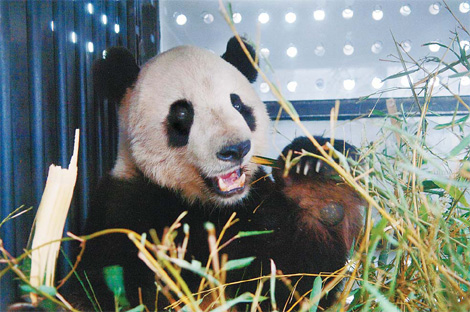Society
Sichuan welcomes new superstars
By Huang Zhiling and Zhang Ao (China Daily)
Updated: 2010-02-06 08:30
 |
Large Medium Small |
Airport crowds cheer arrival of US-born pandas
CHENGDU: It was the kind of welcome usually reserved for Hollywood stars and world leaders, but as the crew of the "Panda Express" unloaded its precious cargo on Friday after landing in Chengdu, capital of Sichuan province, it was obvious that this arrival meant far more to the cheering crowds that had gathered to meet the plane.
 Tai Shan enjoys a feast upon his arrival at Chengdu's Shuangliu International Airport on Friday. [Sang Qing] |
Experts and media thronged Shuangliu International Airport's parking apron for more than two hours to get a glimpse of Tai Shan and Mei Lan, the two United States-born pandas who were arriving in their homeland for the first time.
The very special FedEx delivery landed at
4:26 pm but excited onlookers had to wait another 30 minutes before the guests of honor made an appearance.
|
||||
The "Panda Express" is a custom-decaled 777 freighter, the world's largest twin-engine cargo aircraft. Both animals had separate air-conditioned enclosures and were cared for during the flight by a team of experts.
Their luggage included water, 75 kg of bamboo, their favorite fruits, biscuits and a box of farewell letters from the US public.
Tai Shan, who is male, was born at the National Zoological Park in Washington DC and attracted millions of visitors during four and a half years there. Mei Lan, a 3-year-old female, was born and raised in the Zoo Atlanta in Georgia.
Under the agreement for global giant panda preservation, giant pandas born overseas belong to China and must be sent back after they turn 2 years old. However, China agreed to extend Tai Shan's loan.
After a brief welcoming ceremony in the airport terminal, the pandas were loaded on separate trucks at about 6:30 pm. Tai Shan looked calm and at ease, while Mei Lan seemed restless.
"The pandas were healthy during the flight. Tai Shan slept a lot and ate some 25 kg of bamboos, which even surprised me," said Nicole Meese, 36, Tai Shan's keeper since he was a month old.
Meese said she only slept three hours during the trip because she was comforting Tai Shan, feeding and playing with him, as well as scratching his ears.
"I can't believe baby bear is leaving us," she said tearfully. She explained that she called him "baby bear" before he was officially named.
"I still can't forget when he was a month old how he gradually opened his eyes, then ears and began to take in his world," said Meese, who will spend two days with Tai Shan at the Bifengxia Base of the China Conservation and Research Center for the Giant Panda in Ya'an, which is 150 km from Chengdu.
Mei Lan arrived in her new home at the Chengdu Research Base at 7:10 pm, while Tai Shan arrived at the Bifengxia Base at 8:40 pm.
According to Huang Yan, deputy general engineer of the China Conservation and Research Center, Tai Shan was calm in his new home.
"After a long flight of about 15 hours and meeting many people, Mei Lan is nervous in her temporary home in the quarantine house in Chengdu. She runs here and there, climbs up and down railings and breathes quickly," Huang told China Daily. He said it could take her one or two days to adjust to her new surroundings.
Both pandas will be in quarantine for 30 days before they are presented to the public.
After quarantine, Tai Shan will live in a
30-sq-m den in the so-called No 1 Villa, which is the most frequently visited venue at the Bifengxia Base. He will also have 1,000 sq m of land where he can climb trees and frolic with other pandas his age, said Tang Chunxiang, an expert with the China Conservation and Research Center.
Before Tai Shan left the airport in Chengdu, a ceremony was held to mark its lifelong adoption by a Sichuan auto firm. Any individual or firm adopting a panda offers money to the bear each year.
Li Desheng, deputy chief of the China Conservation and Research Center, did not reveal how much the Sichuan firm had paid.
Many individuals and firms had shown interest in adopting Mei Lan, according to Zhang Zhihe, chief of the Chengdu Research Base.











